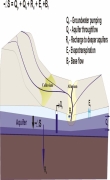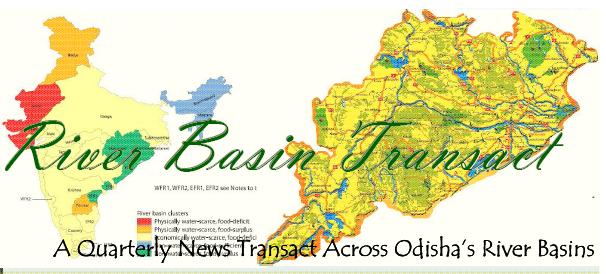Photos, Illustrations and other Images
Groundwater balance – A presentation by ACWADAM
Posted on 21 Sep, 2010 10:00 PM This presentation by ACWADAM deals with the subject of groundwater balance. It begins by describing the skeleton for the water balance equation viz., ground surface, soil, aquifer and bed rock. It describes the processes subsequent to rainfall such as interception, initial detention, depression storage, infiltration, runoff, streamflow, soil moisture retention and recharge.
This presentation by ACWADAM deals with the subject of groundwater balance. It begins by describing the skeleton for the water balance equation viz., ground surface, soil, aquifer and bed rock. It describes the processes subsequent to rainfall such as interception, initial detention, depression storage, infiltration, runoff, streamflow, soil moisture retention and recharge.
The watershed water balance equation is explained in terms of input (rainfall and water transfers) and output (runoff, evapotranspiration and infiltration). It notes that the input to a generalized water balance is rainfall whereas the input to a groundwater balance is infiltration. The difference between infiltration & recharge, natural & artificial recharge and interflow & discharge are explained thereafter. The water balance for an aquifer may vary, depending upon the nature of groundwater system –
- Watershed with a deep aquifer
- Watershed has both shallow and deep aquifers
- Watershed has only shallow aquifer
Groundwater management under the climate change scenario in India – A presentation by ACWADAM
Posted on 20 Sep, 2010 08:17 AMThis presentation by ACWADAM deals with the issue of groundwater management under the climate change scenario in India. Climate change is a change in the statistical distribution of weather over periods of time that range from decades to millions of years. The causes are -variations in solar radiations, plate tectonics, volcanism and change in earths orbit & axis.
Leh cloud-burst: A first-hand account
Posted on 16 Aug, 2010 11:44 AMMidnight, August 6, 2010: "Link, wake up! Water is coming in from the roof!" My mother and I were in Leh, Ladakh, staying at "Eco-Homestay," the house of Mr. Sonam Gyatso and family, in Lower Sankar. The house was made in a hybrid of traditional and modern construction techniques: the main hall in the house was concrete, while rooms surrounding it were made of sun-dried mud bricks, and roofed with Poplar beams, a mesh of willow branches, and a thick pad of fine clay-like mud. The house incorporated passive solar building techniques, such as a direct-gain room, and a Trombe wall, and had solar-powered lighting. It had been raining since evening, and by midnight the clay roof was saturated and began to leak.
We were in Leh for the express purpose of meeting with Helena Norberg-Hodge, the founder of the International Society for Ecology and Culture, co-founder of the International Forum on Globalization, founder of the Ladakh Ecological Development Group, and founder of the Women's Alliance, Ladakh. We had learned of her online, seeing an article of hers in CounterCurrents.org, and watching her video "Ancient Futures." She is the only person who has critically witnessed the "development" of Ladakh, from complete self-sufficiency in an exceedingly fragile eco-system, to the disaster under which it writhes today. She has seen how "development" pulls people into a money economy, increases the distance between production and consumption, brings reliance on fossil fuels (especially apparent in Leh where fuel and commodities are trucked in over a hazardous two-day journey from lower altitudes), results in urbanization and rural-urban migration, and brings psychological impoverishment to the people it is inflicted upon. For 35 years, she has been working to bring safe, stable, and ecologically sound development to the region through her organizations. Her work today, no longer limited to Ladakh, is focussed on spreading economic literacy among people throughout the planet, educating about the deeper impacts of globalization and today's consumer mono-culture. Garnered from her years of observation and research, she has an important message for humanity today, which is what prompted us to go and meet her.
The neocolonial path to power - Article in the Himal Southasian
Posted on 13 Aug, 2010 10:15 AMThis is a translation from the Nepali of an article that first appeared in Nepal magazine on 11 July 2010. Dipak Gyawali is member of the panel of experts reviewing the Mekong River Commission’s Basin Development Plan and vice-chair of the technical committee of the UN’s World Water Assessment Programme. He was Nepal’s Minister for Water Resources during 2002-03.
Many Nepalis would be shocked to hear that Bhutan will face load- shedding from the coming winter. The citizens of Nepal have, after all, been told for decades that Bhutan has done a great job of developing hydroelectricity, that it has earned significant money by exporting electricity to India, and thus it has been able to achieve the highest per capita income in Southasia. Conversely, Nepal has been ridiculed for wallowing in ‘empty nationalism’ and stirring ‘needless’ controversies over the Mahakali Treaty of 1996 (for water sharing on the Mahakali River) as well as hydropower projects such as the West Seti, both of which involve export of electricity to India.
Flood situation on 8-10th August in Odisha
Posted on 11 Aug, 2010 11:20 AM![]()
This initiative is an attempt to provide daily updates on Flood Situations and related events/news to water enthusiasts, professionals and citizens concerned about flood in Odisha. News and information collected from Odia news papers, English media (internet editions) and web site of Department of Water Resources, Govt of Odisha are put together at one place to provide an overview of flood in Odisha on a daily basis.
Dr. G. D. Agrawal , the scientist, environmentalist and rishi
Posted on 27 Jul, 2010 03:52 PMDr. G. D. Agrawal Scientist and Rishi
Meeting Dr. G. D. Agrawal in his spartan, two room cottage in Chitrakoot, Madhya Pradesh, you would never guess what an accomplished and distinguished scientist he is – first Member-Secretary of the Government of India’s Central Pollution Control Board, former Head of the Department of Civil and Environmental Engineering at IIT Kanpur and a PhD from the University of California, Berkeley. The list goes on and on.
Yet this eminent professional sweeps his own floors, washes his own clothes and cooks his own meals. He retains only a few possessions and dresses in homespun khadi. At the age of 76, his main mode of transport within Chitrakoot is a bicycle and when he travels further afield, he goes by ordinary bus and second-class train. These are the deliberate choices of a devout Hindu whose deepest values are for simplicity and reverence for nature. Dr G.D. Agrawal is the doyen of environmental engineering professionals in India. Well past retirement, he continues to teach and inspire students as an Honorary Professor of Environmental Sciences at the Mahatma Gandhi Chitrakoot Gramodaya Vishwavidyalaya, in Chitrakoot (M.P.).
Empowerment through action:The story of Anna Lakshmi
Posted on 08 Jan, 2010 01:39 AMThis article shows how women are catalysts for advocating widespread improved sanitation and – at the same time – reap substantial benefits in a program promoted by an NGO called Gandhigram Trust. The empowerment of women and marginalized populations is a vital step in realizing gender equality – equal access, planning, and management – for water and sanitation.
Village of tomorrow, village of today - Sanitation justice in Tamil Nadu:A photo essay
Posted on 06 Jan, 2010 02:28 AMPeople’s Science Institute Calendar 2010- Pictures of the Gori Ganga
Posted on 29 Dec, 2009 12:30 PMGuest Post by: Ravi Chopra (People’s Science Institute)
I have before me PSI’s new calendar for 2010. Even at the risk of sounding immodest, I think it is stunning. I thought that our 2009 calendar on river Ganga could not be topped. But I think that aesthetically this one is better! A pdf version is attached.
I would like to urge you to order your copies before they are sold out. The pricing structure is
In India (includingpostage) | Abroad (including postage) |
| 1 to 49 calendars @ 150 each | 1 to 9 @ US $ 15 each |
| 50 to 99 calendars @ 125 each | 10 to 49 @ US $ 12 each |
| 100 or more calendars @ 100 each | 50 or more @ US $ 10 each |
The 2010 calendar features Gori Ganga, one of Uttarakhand’s remote and pristine rivers. The photographs capture the sun-bathed beauty of the lower valley, the wilderness of the upper catchment and the quietude that comes with the remoteness. Our dynamic photographers, Devraj Agrawal and Salil Das trekked on foot and pony for four days from Munsiyari to Milam glacier, the source of the river, to bring you some rare and breath-taking photos.
Photo essay on water loss due to leaks in Mulbagal, Karnataka
Posted on 25 Oct, 2009 07:58 PMAs I had been waking up to the leaky tap in my new house for quite some time; I thought it would be interesting to look at the different ways water gets wasted. In this post I attempt to do a photo blog from my past photo collections on this subject from different parts of the country.
